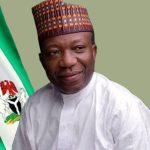
By Naomi Sharang
Prof. Abubakar Sulaiman, Director-General National Institute for Legislative and Democratic Studies (NILDS), has urged African parliamentarians to act fast in tackling insecurity on the continent.
He made the call on Tuesday, in Abuja during a working visit to NILDS by a delegation from the Ethiopian Oromia Regional Parliament led by the Speaker, Seada Abdurahman.
Receiving the delegation, Sulaiman said that Africa as a continent is facing a lot challenges bothering on security, development and good governance.
There is no country in Africa today that is immune to insecurity in one way the other; be it on religious fundamentalism or ethnic secession.
We are facing a lot of challenges bothering on terrorism; issues of economic growth and development; a lot of people are jobless and issues of unemployed youths, out of school children and starvation.
Within the context of Afrocentric policy, the era of looking onto our colonial powers has gone.
We must device African solution to African problems, Sulaiman said.
He further said that it was high time for African governments to look onto ourselves as Africa.
That is why a lot of innovations, Conventions and Protocols came up that Africa must develop Africa panacea to addressing Africans problem.
We must find a way to most of these problems.
On some of its legislative interventions in tackling insecurity in Nigeria, Sulaiman said that NILDS had in the last one year, partnered with donor agencies like Konrad Adenauer Stiftung (German Foundation) in coming up with bills to solve insecurity.
He said, We also partnered with the Office of the Speaker House of Representatives to review the security sector regime.
While saying that the essence of democracy is to ensure good governance, Sulaiman added that it was essential for stakeholders to identify what the problems are.
He said that the initiative had produced nine new bills for the Nigerian Parliament which tend to examine the security problems facing the country.
The director-general listed the bills to include: the Armed Forces Amendment Bill; Proliferation of Small Arms Bill and National Security and Civil Defence Bill.
Sulaiman also noted that Nigeria and Ethiopia share a lot in common in terms of population, culture, religion and in terms of long years of struggle for emancipation.
Nigeria is the largest country in Africa with about 200 million people while Ethiopia is the second largest in Africa with almost 120 million people.
The two countries share a lot of diversity in terms of multiplicity of ethnic groups. In Nigeria we have more than 250 ethnic groups while Ethiopia, that is Oromia region alone has above 80 ethnic groups.
As such, if you have decided to visit us in the institute, that idea is not out of place. We welcome you to our institute, he said.
In her remarks, the speaker of the Ethiopian Oromia Regional Parliament, Abdurahma, commended NILDS for the administrative support to the parliamentarians and the standing committees of the house.
Abdurahman who spoke through an interpreter said the Ethiopian regional council is very grateful to the institute. We will work closely with NILDs and we will take the lesson learnt back to our country.
She assured of strengthening bilateral-relationship between Ethiopia and Nigeria.
On his part, Mr Mamush Lellisa, Director of Capacity Building of the Ethiopian Regional Parliament, said they were in Nigeria to garner experience from the legislative institution.
We will use the experience gained to improve on our democratic practices, he said.(NAN) (www.nannews.ng)
Edited by Julius Toba-Jegede
Source: NAN News